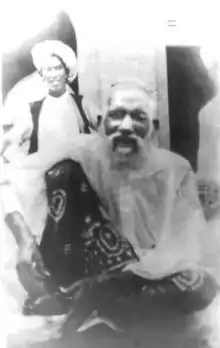Taj Mahmud Amroti | |
|---|---|
 | |
| Personal | |
| Born | 1857 |
| Died | 1929 |
| Religion | Islam |
Taj Mahmūd Amrōtī (Sindhi: مولانا سيد تاج محمود امروٽي, Urdu: مولانا سید تاج محمود امروٹی) (born in Deewani village, Khairpur, Sindh, 1857; died 1929) was a scholar, fighter against British control of India, and educationalist. He led the "Reshmi Roomal" and "Hijrat Movement" of protest emigration to Afghanistan.[1] Amroti helped Khilafat Movement of Turkish Khilafat / Khalifah by sending financial help and troops of his followers, force named as Junood-e-Rabbani i.e. the Forces of Allah.[2][3]
Amroti translated the Qurʾān into Sindhi, gave lectures, wrote books of poetry, and edited the monthly journal Ikhwān-ul-Muslimīn. A proponent of the non-cooperation movement in India, he was a leader of the Khilafat Movement and a founding member of Jamʿiyyat-i ʿUlamā-i Hind.[4]
References
- ↑ Rasheed, Shaikh Abdul (19 June 2020). "The Legend of Maulana Taj Mahmood Amroti". The Friday Times.
- ↑ Mughul, Muhammad Yakub (1988). Studies on Sind. Pakistan Study Centre. p. 118. OCLC 18541195.
- ↑ Cannā, Maḥbūbu ʻAlī (1971). Various trends in Sindhi literature. Idara-i-Saleh Series. p. 26. OCLC 1031077.
- ↑ Ujan, Badruddin (2007). "Moulana Taj Mahmood Amroti (1857-1929)". The Reporter.
{{cite web}}: Missing or empty|url=(help)
Bibliography
- Qureshi, M. Naeem (1999). Pan-Islam in British Indian Politics: A Study of the Khilafat Movement, 1918–1924. Brill Academic Publishers. p. 224. ISBN 978-90-04-11371-8.